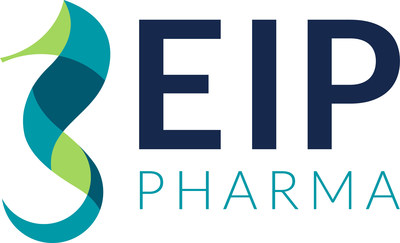EIP Pharma, Inc. (www.eippharma.com), a CNS-focused therapeutics company, today announced that the efficacy and safety data from the REVERSE-SD clinical study were presented at the Clinical Trials in Alzheimer’s Disease (CTAD) meeting in San Diego by the principal investigator of the study, Professor Philip Scheltens of the VU Medical Center in Amsterdam, Netherlands.
|
BOSTON, Dec. 5, 2019 /PRNewswire/ -- EIP Pharma, Inc. (www.eippharma.com), a CNS-focused therapeutics company, today announced that the efficacy and safety data from the REVERSE-SD clinical study were presented at the Clinical Trials in Alzheimer's Disease (CTAD) meeting in San Diego by the principal investigator of the study, Professor Philip Scheltens of the VU Medical Center in Amsterdam, Netherlands. As previously announced, the 24-week, double-blind placebo-controlled Phase 2b study evaluating the oral p38⍺ kinase inhibitor neflamapimod in early-stage Alzheimer's disease did not meet its primary objective of improving episodic memory, but did meet its secondary objectives of target engagement and proof-of-mechanism through demonstrating statistically significant reductions relative to placebo in cerebrospinal fluid (CSF) levels of phospho-tau and tau. In addition, in pre-specified pharmacokinetic-pharmacodynamic (PK-PD) analyses, positive trends relative to placebo on both the Hopkins Verbal Learning Test (HVLT) and Wechsler Memory Scale (WMS) were evident in neflamapimod-treated patients whose plasma drug concentrations were in the highest quartile within the study. Neflamapimod at 40 mg twice daily, the dose evaluated in the study, was well tolerated. The full presentation is available on the Company's website at www.eippharma.com/presentations.
"The CSF biomarker effects of neflamapimod demonstrate (1) target engagement and (2) p38⍺ kinase inhibition impacts the AD disease process, that is, provides proof-of-mechanism," concluded Professor Philip Scheltens of the VU Medical Center in Amsterdam, and the principal investigator of the study. "The CSF biomarker effects, combined with the episodic memory effects in patients with the highest blood concentrations of neflamapimod, indicate that a study of longer duration and at a higher dose of neflamapimod in patients with early-stage AD is merited and has the potential to demonstrate proof-of-concept." "While in the overall study population, treatment with neflamapimod did not demonstrate improved episodic memory relative to placebo in this relatively short duration study, the PK-PD (pharmacokinetic-pharmacodynamic) analysis strongly suggests the dose of neflamapimod was too low for a significant clinical effect, with an optimal dose likely to be 50 to 100 percent higher than the dose evaluated in the REVERSE-SD study," said Dr. John Alam, President and CEO of EIP Pharma. "Importantly, neflamapimod appeared to have the intended effects on the underlying disease process in early-stage Alzheimer's disease, providing the first evidence that the therapeutic potential of p38⍺ kinase inhibition that has been extensively documented in scientific literature translates into an effect on the human disease process." About the REVERSE-SD Study Study Design Efficacy Results
As a single dose of neflamapimod was utilized in the trial, pre-specified pharmacokinetic pharmacodynamic (PK-PD) analyses were conducted to evaluate the results for potential dose-dependency. These analyses showed improvement, relative to the placebo group, in tests of episodic memory in neflamapimod-treated patients with the highest (top quartile) trough plasma drug concentrations; with positive trends evident both for the primary endpoint (combined change in z-scores of HVLT total recall and delayed recall) and the major secondary endpoint of change in Wechsler Memory Scale Combined Immediate and Delayed Recall composites. Safety Results About Neflamapimod About EIP Pharma Inc For more information, please visit www.eippharma.com.
SOURCE EIP Pharma, Inc. |





